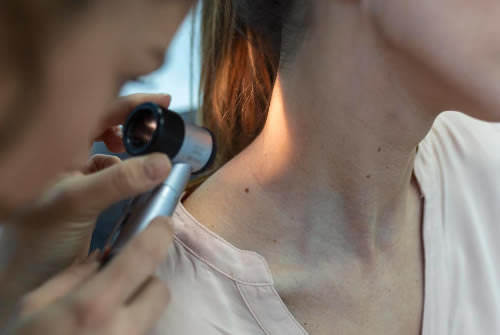Skin cancer is the most common form of cancer in the United States, with more than 3.5 million cases diagnosed each year. While it is highly treatable if caught early, it can be deadly if left unchecked. That’s why it’s so important to see a dermatologist for regular skin cancer screenings.
During a skin cancer screening, a our dermatologist will examine your skin from head to toe to look for any suspicious moles, growths, or other abnormalities. They will also check for any changes in the size, shape, or color of existing moles, as well as for any new growths that may have appeared.
If the dermatologist finds anything unusual during the screening, they may recommend a biopsy to confirm the diagnosis. A biopsy is a simple procedure in which a small sample of the suspicious tissue is removed and examined under a microscope to determine if it is cancerous.
If the biopsy reveals that you have skin cancer, the dermatologist will work with you to develop a treatment plan. This may include surgery to remove the cancerous tissue, as well as other treatments such as radiation or chemotherapy.
The earlier skin cancer is detected, the easier it is to treat. That’s why it’s so important to see a dermatologist like Dr. Raskin for regular skin cancer screenings. Even if you don’t have any obvious signs of skin cancer, it’s still a good idea to get checked out by a dermatologist on a regular basis, as they are trained to spot even the smallest and most subtle changes in your skin.
The DO’s and DONT’s about skin cancer
DO:
- Wear protective clothing and accessories, such as a wide-brimmed hat, sunglasses, and long-sleeved shirts and pants, when you’re outside, especially between 10 a.m. and 4 p.m. when the sun’s rays are the strongest.
- Use a broad-spectrum sunscreen with an SPF of at least 30 on all exposed skin every day, even on cloudy days. Be sure to apply enough sunscreen and reapply every two hours or immediately after swimming or sweating.
- Seek shade when the sun’s rays are the strongest, especially between 10 a.m. and 4 p.m.
- Get vitamin D safely through a healthy diet that includes foods naturally rich in vitamin D, such as fatty fish and egg yolks, and/or by taking a daily supplement.
- Examine your skin regularly and check with a dermatologist if you notice any changes in the size, shape, or color of your moles or any other unusual growths on your skin.
DON’T:
- Don’t skip wearing sunscreen because you’re using insect repellent or wearing protective clothing. Both are important for protecting your skin.
- Don’t use tanning beds or sunlamps. The UV radiation from these sources can increase your risk of skin cancer.
- Don’t rely on the SPF in your makeup or moisturizer. These products are not meant to replace sunscreen and typically do not provide enough protection on their own.
- Don’t let yourself burn. Even one severe sunburn can increase your risk of skin cancer.
Schedule your skin cancer screening at our Bakersfield location.

